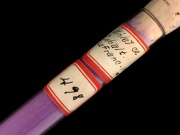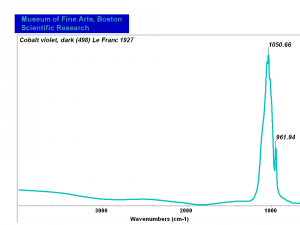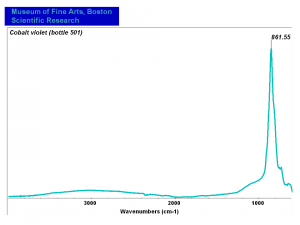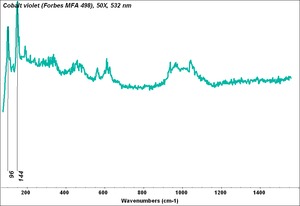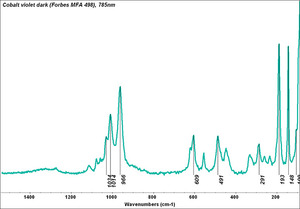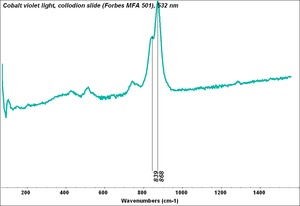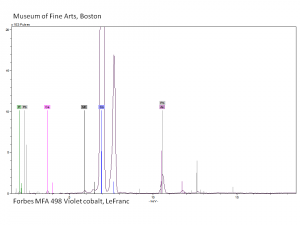Difference between revisions of "Cobalt violet"
Jump to navigation
Jump to search
(username removed) |
(→Risks) |
||
| (16 intermediate revisions by 6 users not shown) | |||
| Line 2: | Line 2: | ||
== Description == | == Description == | ||
| − | A general name for several violet color cobalt pigments. First developed in 1859, cobalt violet was the primary permanent violet pigment available. Cobalt violets range from deep to pale shades with either a pink or blue hue. The first cobalt violets used were composed of [ | + | A general name for several violet color cobalt pigments. First developed in 1859, cobalt violet was the primary permanent violet pigment available. Cobalt violets range from deep to pale shades with either a pink or blue hue. The first cobalt violets used were composed of [[cobaltous arsenate|cobalt arsenate]]. This highly toxic compound is now rarely used. Instead most current cobalt violets are nontoxic and are made from either [[cobaltous phosphate|cobalt phosphate]], or [[cobaltous ammonium phosphate|cobalt ammonium phosphate]]. Cobalt violets are used in paints, glass, glazes and enamels. |
== Synonyms and Related Terms == | == Synonyms and Related Terms == | ||
| Line 8: | Line 8: | ||
cobalt arsenate (light); cobalt phosphate (deep); Kobaltviolett (Deut.); violeta de cobalto (Esp.); violet de cobalt (Fr.); violetto di cobalto (It.); violeta de cobalto (Port.) | cobalt arsenate (light); cobalt phosphate (deep); Kobaltviolett (Deut.); violeta de cobalto (Esp.); violet de cobalt (Fr.); violetto di cobalto (It.); violeta de cobalto (Port.) | ||
| − | == | + | [[[SliderGallery rightalign|Cobalt Violet, dark (498).PNG ~FTIR (MFA) (Cobalt Phosphate 498)|Cobalt Violet(501).PNG~FTIR (MFA) (Cobalt Arsenate 501)|Cobalt violet (Forbes MFA 498), 50X, 532 nm.TIF~Raman (MFA) (532nm)|Cobalt violet dark (Forbes MFA 498), 785nm resize.tif~Raman (MFA) (785nm)|Cobalt violet light, collodion slide (Forbes MFA 501), 532 nm.TIF~Raman (MFA) (532nm)|Slide11_F498.PNG~XRF (MFA)]]] |
| + | == Risks == | ||
| − | Skin contact may cause allergies, especially on elbows, neck and ankles. Chronic inhalation may cause asthma. Ingestion may cause vomiting, diarrhea and the sensation of hotness. | + | * Skin contact may cause allergies, especially on elbows, neck and ankles. |
| + | * Chronic inhalation may cause asthma. | ||
| + | * Ingestion may cause vomiting, diarrhea and the sensation of hotness. | ||
| − | == | + | == Resources and Citations == |
| − | + | * Pigments Through the Ages: [http://webexhibits.org/pigments/indiv/overview/coviolet.html Cobalt violet] | |
| − | + | * Corbeil, Marie-Claude, Jean-Pierre Charland, Elizabeth Moffatt. 'The characterization of cobalt violet pigments' ''Studies in Conservation'' vol.47 (2002), pp.237-249. | |
* R. J. Gettens, G.L. Stout, ''Painting Materials, A Short Encyclopaedia'', Dover Publications, New York, 1966 | * R. J. Gettens, G.L. Stout, ''Painting Materials, A Short Encyclopaedia'', Dover Publications, New York, 1966 | ||
| Line 22: | Line 25: | ||
* Ralph Mayer, ''A Dictionary of Art Terms and Techniques'', Harper and Row Publishers, New York, 1969 (also 1945 printing) | * Ralph Mayer, ''A Dictionary of Art Terms and Techniques'', Harper and Row Publishers, New York, 1969 (also 1945 printing) | ||
| − | * ''Encyclopedia Britannica'', http://www.britannica.com Comment: "Cobalt Processing." | + | * ''Encyclopedia Britannica'', http://www.britannica.com Comment: "Cobalt Processing." Accessed: 15 Apr. 2004. |
| − | * Website | + | * Website: http://webexhibits.org/pigments/indiv/overview/coviolet.html - developed 1859 |
* Thomas B. Brill, ''Light Its Interaction with Art and Antiquities'', Plenum Press, New York City, 1980 | * Thomas B. Brill, ''Light Its Interaction with Art and Antiquities'', Plenum Press, New York City, 1980 | ||
Latest revision as of 13:07, 30 May 2022
Description
A general name for several violet color cobalt pigments. First developed in 1859, cobalt violet was the primary permanent violet pigment available. Cobalt violets range from deep to pale shades with either a pink or blue hue. The first cobalt violets used were composed of cobalt arsenate. This highly toxic compound is now rarely used. Instead most current cobalt violets are nontoxic and are made from either cobalt phosphate, or cobalt ammonium phosphate. Cobalt violets are used in paints, glass, glazes and enamels.
Synonyms and Related Terms
cobalt arsenate (light); cobalt phosphate (deep); Kobaltviolett (Deut.); violeta de cobalto (Esp.); violet de cobalt (Fr.); violetto di cobalto (It.); violeta de cobalto (Port.)
Risks
- Skin contact may cause allergies, especially on elbows, neck and ankles.
- Chronic inhalation may cause asthma.
- Ingestion may cause vomiting, diarrhea and the sensation of hotness.
Resources and Citations
- Pigments Through the Ages: Cobalt violet
- Corbeil, Marie-Claude, Jean-Pierre Charland, Elizabeth Moffatt. 'The characterization of cobalt violet pigments' Studies in Conservation vol.47 (2002), pp.237-249.
- R. J. Gettens, G.L. Stout, Painting Materials, A Short Encyclopaedia, Dover Publications, New York, 1966
- Ralph Mayer, A Dictionary of Art Terms and Techniques, Harper and Row Publishers, New York, 1969 (also 1945 printing)
- Encyclopedia Britannica, http://www.britannica.com Comment: "Cobalt Processing." Accessed: 15 Apr. 2004.
- Website: http://webexhibits.org/pigments/indiv/overview/coviolet.html - developed 1859
- Thomas B. Brill, Light Its Interaction with Art and Antiquities, Plenum Press, New York City, 1980
- Richard S. Lewis, Hawley's Condensed Chemical Dictionary, Van Nostrand Reinhold, New York, 10th ed., 1993
- Random House, Webster's Encyclopedic Unabridged Dictionary of the English Language, Grammercy Book, New York, 1997
- Art and Architecture Thesaurus Online, http://www.getty.edu/research/tools/vocabulary/aat/, J. Paul Getty Trust, Los Angeles, 2000
